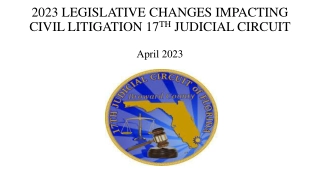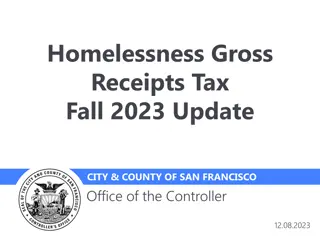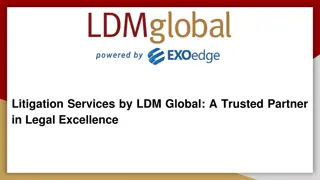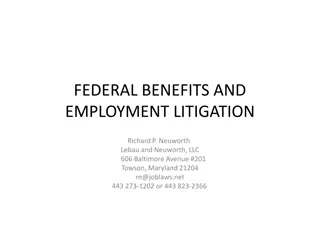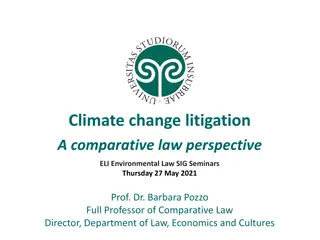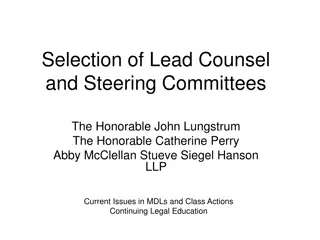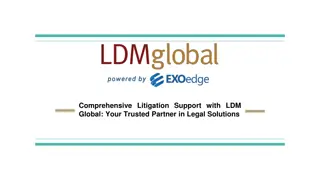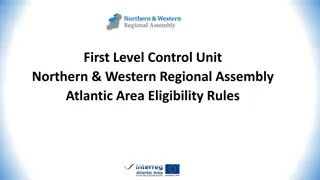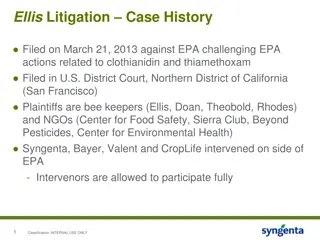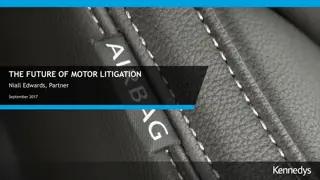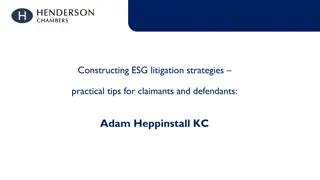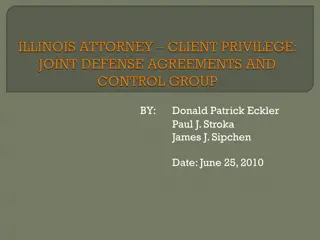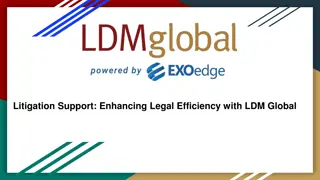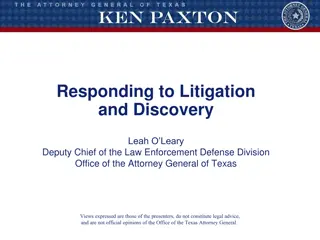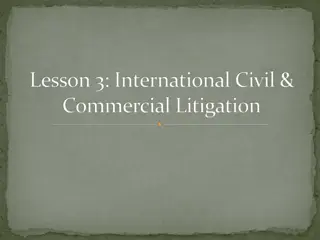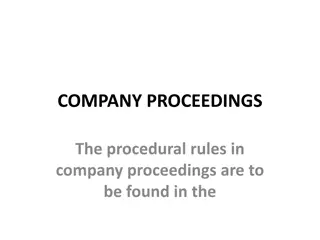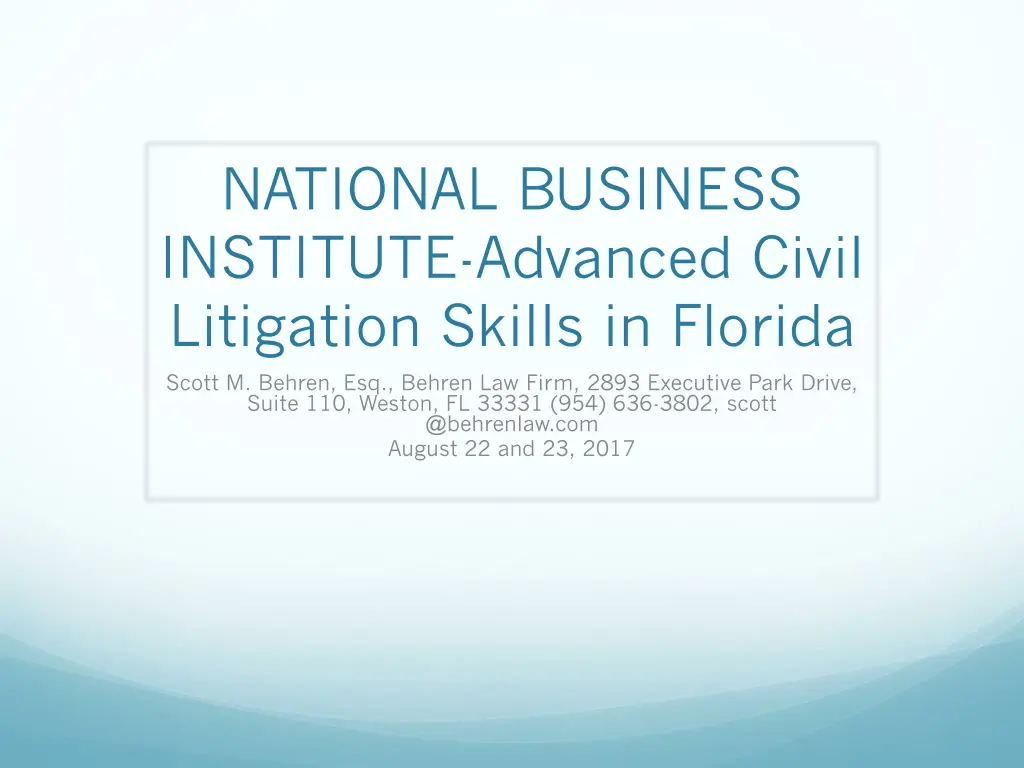
Advanced Civil Litigation Skills in Florida: Rules Changes and Case Examples
Explore key rules changes in civil litigation procedures, including amendments to Rule 4(m) regarding summons and Rule 6 on time computation. Case examples like Obas v. Ritz-Carlton highlight the importance of adhering to these rules for successful legal proceedings.
Download Presentation

Please find below an Image/Link to download the presentation.
The content on the website is provided AS IS for your information and personal use only. It may not be sold, licensed, or shared on other websites without obtaining consent from the author. If you encounter any issues during the download, it is possible that the publisher has removed the file from their server.
You are allowed to download the files provided on this website for personal or commercial use, subject to the condition that they are used lawfully. All files are the property of their respective owners.
The content on the website is provided AS IS for your information and personal use only. It may not be sold, licensed, or shared on other websites without obtaining consent from the author.
E N D
Presentation Transcript
NATIONAL BUSINESS INSTITUTE-Advanced Civil Litigation Skills in Florida Scott M. Behren, Esq., Behren Law Firm, 2893 Executive Park Drive, Suite 110, Weston, FL 33331 (954) 636-3802, scott @behrenlaw.com August 22 and 23, 2017
Rules Changes Reflects Rules Changes in 2015, 2016 and 2017 Few changes made in 2016 and 2017 Many made in 2015
Rule 1-Scope and Purpose of FCRP They should be construed and administered, and employed by the court employed by the court and the parties to secure the just, speedy and inexpensive determination of every action and proceeding. and Added to ensure cooperation among parties in dealing with discovery
Rule 4(m)-Summons Several Amendments in 2015, 2016 and 2017 Shortened time for service of Summons from 120 days to 90 day
Rule 4(m)-Summons Ronald Obas v. Ritz-Carlton Hotel Company, LLC, Case No: 17-cv-150-FtM (M.D. Fla. 7/24/17) Citing to new Rule requiring service within 90 days Court may extend for good cause typically were some outside factor prevented service Court may also take into account other factors such as possible expiration of statute of limitations Dismissal under this rule without prejudice
Rule 6. Computing and Extending Time; Time for Motion Papers (d) When a party may or must act within a specified time after being served after being served and service is made under Rule 59(b)(2)(C)(mail with the clerk), with the clerk), or (F) (other means consented to other means consented to), 3 days are added after the period would otherwise expire under Rule 6(a). mail), (D)(leaving (leaving Removes electronic service from means of service that gets 3-day mail rule extension since service is instantaneous
Rule 16(b)(2)-Time to Issue Scheduling Order Change so that Court must issue scheduling order within 90 days (from 120) from when Defendant has been served or 60 days (from 90) after any Defendant has appeared unless the judge finds good cause for the delay In order to have parties and Court move quicker toward bringing case toward resolution
Rule 16(b)(3)(B) (B) the scheduling order may: (iii) provide for discovery or preservation electronically stored information; or preservation of (iv) include any agreements the parties reach for asserting claims of privilege or protection as trial- preparation material after information is produced, including agreements reached under Federal Rule of including agreements reached under Federal Rule of Evidence 502 Evidence 502; (v) direct that before moving for an order relating to (v) direct that before moving for an order relating to discovery, the movant must request a conference with discovery, the movant must request a conference with the court. the court.
Rule 16(b)(3)(B) Rule 502 (attorney client priv and work product) Provides for court to allow ESI preservation in its scheduling order Providing for conference with judge on discovery disputes in lieu of Motion to Compel These are permissive but not required
Rule 26(f)(3): Discovery Plan (3) A discovery plan must state the parties views and proposals on: (C) any issues about disclosure, discovery or preservation preservation of electronically stored information, including the form or forms in which it should be produced; or (D) any issues about claims of privilege or of protection as trial-preparation materials, including-if the parties agree on a procedure to assert these claims after production-whether to ask the court to include their agreement in an order under Federal Rules of Evidence under Federal Rules of Evidence 502 502
Rule 26(b)(1): Scope of Discovery (1) Parties may obtain discovery regarding any nonprivileged matter that is relevant to any party s claim or defense and proportional to the needs of and proportional to the needs of the case, considering the importance of the issues the case, considering the importance of the issues at stake in the action, the amount in controversy, at stake in the action, the amount in controversy, the parties relative access to relevant the parties relative access to relevant information, the parties resources, the importance information, the parties resources, the importance of the discovery in resolving the issues, and of the discovery in resolving the issues, and whether the burden or expense of the proposed whether the burden or expense of the proposed discovery outweighs its likely benefit. Information discovery outweighs its likely benefit. Information within this scope of discovery need not be within this scope of discovery need not be admissible in evidence to to discoverable. admissible in evidence to to discoverable.
Rule 26(b)(1): Scope of Discovery reasonably calculated to lead to the discovery of admissible evidence has been removed Seems to be an effort to reign in discovery and prevent overly broad discovery requests Notes realize that this new standard might require more court intervention Objections to discovery should be changed to take out not reasonably calculated language
Rule 26(b)(1): Scope of Discovery CV Restoration, LLC v. Diversified Shafts Solutions, LLC, Case No: 17-mc-00020-EAK-JSS (M.D. Fla. 5/16/17) Goes through analysis of new 26(b)(1) discovery standards as to whether discoverable
Rule 26(b)(1): Scope of Discovery Vilia Polycarpe v. Seterus, Inc., Case No: 16-cv-1606-Orl- 37TBS (M.D. Fla. 5/23/17) Objections which state vague, overly broad or unduly burdensome are meaningless and without merit General Objections prefacing response serve no purpose other than to waste the readers time Boilerplate objections are overruled Must evaluate discovery request based upon proportionality factors, but non specific objections are overruled
Rule 26(b)(1): Scope of Discovery American Home Assurance Company v. Weaver Aggregate Transport, Inc., Case No: 10-cv-329-Oc-10PRL (M.D. Fla. 6/23/17) Proportionality requires counsel and the court to consider whether relevant information is discoverable in light of the needs of the case. In making this determination the court is guided by the non-exclusive list of factors in Rule 26(b)(1). Must start with actual claims and defenses and how discovery bears on claims and defenses Not permitted to assert boilerplate objections
Rule 26(d)(2): Scope of Discovery (2) Early Rule 34 Requests. 2) Early Rule 34 Requests. (A) Time to Deliver. More than 21 days after the (A) Time to Deliver. More than 21 days after the summons and complaint are served on a party, a summons and complaint are served on a party, a request under Rule 34 may be delivered: request under Rule 34 may be delivered: (i) to that party by any other party, and (i) to that party by any other party, and (ii)by the party to any plaintiff or to any other party that (ii)by the party to any plaintiff or to any other party that has been served. has been served. (B) When Considered Served. The request is considered (B) When Considered Served. The request is considered by have been served at the first Rule 26(f) conference by have been served at the first Rule 26(f) conference
Rule 26(d)(2): Scope of Discovery Seems to eliminate rule that discovery may now only be served after Rule 26 conference Now may serve document requests 21 days after service of Summons and Complaint Although not deemed served until Rule 26 Conference
Rule 34(b)(2):Responding to Document Requests (B) Responding to Each Item. For each item or category, the response must state that inspection and related activities will be permitted as requested or state with specificity the grounds for objecting with specificity the grounds for objecting to the request, including the reasons. The responding party may state that it will produce copies of documents or may state that it will produce copies of documents or electronically stored information instead of permitting electronically stored information instead of permitting inspection. The production must then be completed no inspection. The production must then be completed no later than the time for inspection specified in the later than the time for inspection specified in the response. response. The responding party (C) An objection must state whether any responsive An objection must state whether any responsive materials are being withheld on the basis of that materials are being withheld on the basis of that objection. objection. An objection to part of a request must specify the part and permit inspection of the rest.
Rule 34(b)(2):Responding to Document Requests Intended to curb use of boilerplate objections that provide no real reason for the objection Amendments intended to address practice of responding but not providing documents by a date certain Must now state what whether documents are being withheld in response to a particular objection
Rule 34(b)(2):Responding to Document Requests Cielo Jean Gibson et. al. v. Resort and Paradise Lakes, LLC, Case No: 16-cv-791-T-36AAS (M.D. Fla. 2/24/17) As already stated above, the Court notes that Defendants offered the boilerplate objections of vague, overbroad, irrelevant or not reasonably calculated to lead to the discovery of admissible evidence and often a combination of these boilerplate objections. As made clear by the 2015 amendments to the Federal Rules of Civil Procedure, these boilerplate objections are not proper... Further, in addition to being boilerplate, Defendants' objections that the requested documents are "not reasonably calculated to lead to the discovery of admissible evidence" is a restatement of the former language from Rule 26(b)(1). That language was removed when Rule 26 was amended in 2015. In light of the foregoing, Defendants' boilerplate objections are overruled.
Rule 37(e):Failure to Preserve ESI (e) Failure to Preserve Electronically Stored Information. If electronically stored information that should have been preserved in the anticipation or conduct of litigation is lost because a party failed to take reasonable steps to preserve it, and it cannot be restored or replaced through additional discovery, the court: (1) upon finding prejudice to another party from loss of the information, may order measures no greater than necessary to cure the prejudice; or
Rule 37(e):Failure to Preserve ESI (2) Only upon finding that the party acted with the intent to deprive another party of the information s use in the litigation may: (A) presume that the lost information was unfavorable to the party; (B) instruct the jury that it may or must presume the information was unfavorable to the party; or (C) dismiss the action or enter a default judgment
Rule 37(e):Failure to Preserve ESI Marvel Snider v. Danfoss, LLC, Case No: 15 CV 4748 (N.D. Ill. 7/12/17) Great detail into application of 37(e) factors Ultimately awards no sanctions because Court finds no prejudice
Rule 37(e):Failure to Preserve ESI TLS Management and Marketing Services, LLC v. Ricky Rodriguez-Toledo, Case No: 15-2121 (D. P .R. 3/27/17) Grants spoliation sanctions under Rule 37(e), provides adverse-inference instruction based upon willful discarding of laptop and external hard drive Also forensic examination of external hard drive providing for possible further sanctions and possible default
Rule 37(e):Failure to Preserve ESI Tiffany Hsueh v. N.Y. State Dept of Fin. Services, Case No: 15 civ 3401 (S.D. N.Y. 3/31/17) Deletion of recording was done to prevent use of it in litigation and in bad faith despite obligation to preserve the recording Granting of discovery sanctions in form of attorneys fees and costs and re-opening of discovery
Rule 37(e):Failure to Preserve ESI Alabama Aircraft Industries, Inc. v. The Boeing Company, Case No: 2:11-cv-03577-RDP (N.D. Al. 3/9/17) Circumstantial evidence that Boeing acted with an intent to delete or destroy ESI Provision of adverse inference instruction to jury and award of fees and costs in bringing Motion
Rule 82: Jurisdiction and Venue Unaffected These rules do not extend or limit the jurisdiction of the district courts or the venue of actions in those courts. An admiralty or maritime claim under Rule 9(h) is governed by 28 U.S.C. 1390 governed by 28 U.S.C. 1390. Intended to reflect new statute which exempts maritime law actions from typical venue rules under the Federal Rules.

